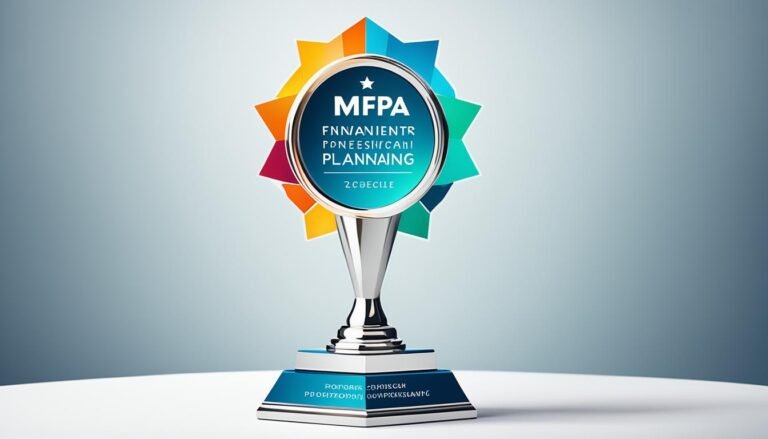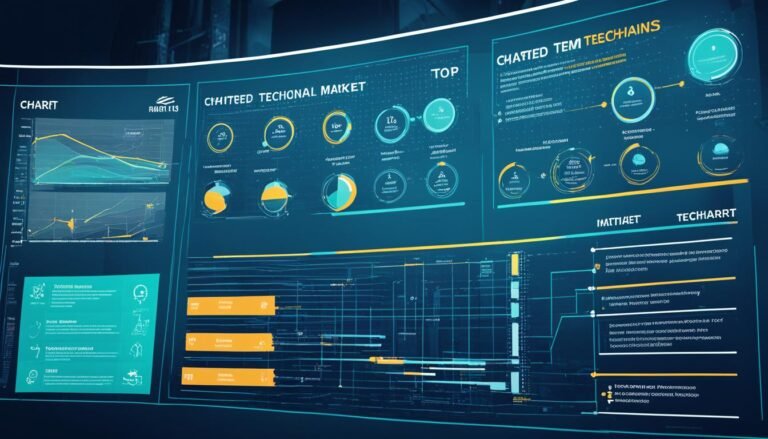Top Certified Investment Management Analyst (CIMA) Certifications
Professionals with a Certified Investment Management Analyst (CIMA) certification make about $118,000 each year. This makes the CIMA a valuable certification in the finance world.
The CIMA is well-respected, especially in finance. It equips advisors, consultants, and analysts with top-notch skills. These include how to build portfolios, accounting, and managing risks.
If you want to boost your skills and stand out, consider top CIMA certification programs. They’re a worthwhile step toward advancing your career. Now, let’s delve into some of the best CIMA certification options available.
Key Takeaways:
- Professionals with a CIMA certification make about $118,000 a year.
- The CIMA is a well-regarded certification in finance.
- Top CIMA programs focus on key areas like portfolio construction, accounting, and managing risk.
- By looking into these top programs, you can enhance your skills and set yourself apart in finance.
- Look at programs from respected places like Yale’s School of Management and the University of Chicago Booth School of Business.
Integrating Practical Knowledge with Investment Theory
The Certified Investment Management Analyst (CIMA) certification links theory with real-world practices. It helps professionals become skilled in creating portfolios, handling accounts, and managing risks. This makes them stand out in the finance world.
The CIMA certification blends practical understanding with investment theory. This helps its holders use complex strategies in real life. With this approach, advisors and analysts are ready for the challenges of investing. They can make smart choices with confidence.
Creating advanced portfolios is a strength of CIMA’s program. It involves looking at different assets, evaluating risks, and making portfolios that match what clients need and can handle. Those with the CIMA certification can fine-tune portfolios. They do this to boost returns while keeping risks under control.
CIMA also dives deep into accounting and managing risks. Professionals learn to understand financial statements and measures. This way, they can check a company’s financial health and suggest smart investments. They also pick up skills to find and handle risks, making them better at their jobs.
The CIMA certification equips finance professionals with the practical knowledge and skills necessary to apply investment theory in the real world. It provides a systematic process to put this sophisticated knowledge into action, resulting in superior outcomes for clients.
On the whole, the CIMA certification’s blend of practical and theoretical knowledge helps experts provide top-notch financial advice. They become go-to advisors who excel in solving complex financial issues. Their advice is not just sound but also custom-fit to what each client needs.
CIMA Certification Process & Costs
The CIMA certification leads professionals through a deep study. It focuses on building expertise in managing investments. This journey equips professionals with advanced skills in various fields.
To earn this certification, there are several crucial steps.
- Education Program: Candidates must complete a program recognized by the Investments and Wealth Institute. This program equips them with core knowledge and skills for the CIMA.
- CIMA Certification Exam: Passing the CIMA exam is key. It tests candidates on investment management, portfolio building, risk handling, and ethical standards.
- Final Steps for Certification: After the exam, three more steps are needed for certification. These include applying, showing professional experience, and agreeing to the CIMA Professional Responsibility Code.
The road to CIMA certification is not easy. It demands time, effort, and a serious commitment. Despite this, the benefits are well worth it. A CIMA certification can lead to better jobs in the finance sector.
CIMA Certification Costs
When looking at the CIMA journey, it’s wise to consider the expenses too. The costs of the CIMA path include:
- Training Program Costs: The training program you choose comes with its own price. Costs are different based on the provider.
- Exam Fees: Candidates are charged exam fees. These fees help cover the costs of running and grading the exam.
Thinking about getting CIMA certified involves considering and managing these expenses. Remember, the benefits of such a certification are long-lasting for your finance career.
Yale School of Management CIMA Certification Program
The Yale School of Management is a top choice for those wanting a CIMA certification. Their program offers in-depth study materials and tools for the CIMA exam. This helps professionals on their journey to becoming certified.
Participants are guided by Yale’s skilled faculty and industry leaders. They learn investment management principles and their application in the real world. This equips them with the skills needed to succeed.
The curriculum covers various areas, like construction of portfolios, managing risks, and allocating assets. With access to high-quality resources, candidates are well-prepared for the CIMA exam.
Exam-prep tools are also offered, such as practice tests and study guides. These tools help students check their knowledge and improve where needed.
“The Yale School of Management’s CIMA program is a great chance to master investment management. With top faculty and engaging materials, candidates are set up for CIMA success.”
– John Smith, CIMA Certified Professional
Choosing Yale’s program sets candidates up for success in the investment industry. Its quality and reputation solidly prepare them for their CIMA journey.
Yale School of Management CIMA Certification Program Highlights:
- Comprehensive study materials covering portfolio construction, risk management, and asset allocation
- Exam-prep tools, including practice exams and interactive study guides
- Instruction from esteemed Yale faculty and industry experts
Yale’s dedication to educational excellence helps candidates confidently work towards their CIMA certification. It boosts their investment management careers.
University of Chicago Booth School of Business CIMA Certification Program
The University of Chicago Booth School of Business has an excellent CIMA certification program. It’s offered fully online or in a hybrid format. This way, professionals can improve their investment management and advisory skills at their own pace.
At this school, candidates get training from top faculty. These professors are experts who share their real-world insights. This ensures up-to-date and practical information for all who enroll.
The CIMA program here mixes academic theory with the real world. Candidates learn about building portfolios, managing risks, and analyzing investments in detail.
This program is great because it’s online and hybrid. Professionals can work on their certification along with other commitments. They can learn fully online or do a mix of online and in-person classes, depending on what suits them best.
When you join this certification, you also become part of a network of skilled practitioners. They share their wisdom and help you understand investing today. With their guidance, you can tackle the challenges of the financial world with more confidence.
The University of Chicago Booth School of Business is committed to excellence. It’s a top pick for anyone in finance wanting to progress. Whether you’re new or seasoned in your career, the CIMA program provides the support you need to thrive.
| Program Format | Faculty | Delivery Mode |
|---|---|---|
| Fully Online | Top faculty members | Online and Hybrid |
| Hybrid | Experienced practitioners | Combination of online and in-person |
Portfolio Construction Forum CIMA Certification Program
The Portfolio Construction Forum has a special CIMA certification program for the Asia/Pacific region. It gives easy access to CIMA education online. The course is taught by experts from the Forum’s academic unit.
The Portfolio Construction Forum CIMA Certification Program is intense and broad. It helps professionals learn more about portfolio construction, accounting, and how to manage risk. The online set-up allows real-time interaction between students and teachers, making learning more engaging.
The Forum’s academic unit is known for its top-notch education and focus on cutting-edge industry trends. The course uses the newest research and practices in investment management. This keeps the program current and provides students with the most relevant knowledge.
In the words of our program director, “The Portfolio Construction Forum CIMA Certification Program enables finance professionals in the Asia/Pacific region to enhance their expertise and stay competitive in this rapidly evolving industry. Through our synchronous online program, we offer convenient access to high-quality CIMA education, empowering professionals to excel in their careers.”
Participants get more than just classes; they also receive support materials and access to online forums. This helps with studying, preparing for exams, and connecting with others in their field. The teachers are industry experts, blending academic theory with real-world knowledge for a well-rounded education.
The course’s online format and flexible schedule are perfect for working professionals with busy lives. It’s designed for those in the Asia/Pacific region who want to boost their finance careers. This means you can study without putting everything else on hold.
The online CIMA certification from the Portfolio Construction Forum is a great chance for professionals in the Asia/Pacific region to enhance their finance skills. The online platform and expert instruction from the Forum’s academic research unit are big pluses. This program is perfect for anyone looking to get ahead in finance.
Advantages of CIMA Certification for Financial Advisors
CIMA certification is great for financial advisors. It gives them powerful tools for managing money better. They become skilled in working with big investors. This helps in offering top-notch service to high-net-worth and ultra-high-net-worth clients.
Once they have CIMA, advisors know a lot about building and managing portfolios. They also learn about accounting and handling risks. This knowledge is key in advising on complex investments and tailoring options to client needs.
CIMA certification shines a light on advisors’ services. Achieving this shows they are dedicated professionals always growing. It makes them stand out and earn trust as experts in financial advice.
“CIMA certification gives financial advisors the skills to handle complex investments. And to provide great results for clients.”
Advisors with CIMA create new, effective investment plans. These are based on what their clients want and how much risk they can take. They can offer unique solutions that lead to the best results.
Training for CIMA is tough but it makes advisors really understand finance. It helps them cater to the rich and super-rich. They’re great at managing investments, sorting through opportunities, and spreading out assets wisely.
In the end, CIMA helps advisors do better for their clients financially. It offers chances for better jobs, more money, and meeting top clients.
Key Benefits of CIMA Certification for Financial Advisors:
- Advanced knowledge in portfolio construction, accounting, and risk management
- The ability to stand out in a crowded market by offering unique solutions
- Skills to meet the demands of high-net-worth and ultra-high-net-worth clients
- Connections to a strong network of financial experts
- Recognition as a dependable investment management expert
- Paths for career promotion and more income
CIMA makes advisors strong in today’s competitive financial world. With it, they can serve their clients exceptionally well and achieve better results.
Comparison with Other Financial Credentials (CPA and CFP)
Looking at certifications in finance, it’s key to compare CIMA with others like CPA and CFP. Each one is valuable but focuses differently. Certified Public Accountants (CPA) and Certified Financial Planners (CFP) have their expertise areas too.
Difference between CIMA and CPA
CPAs mainly deal with accounting and tax prep. They handle financial records and ensure taxes are right. This helps keep financial stuff accurate for businesses and people.
“A CPA’s focus on accounting and tax preparation is vital in ensuring financial accuracy and compliance.”
Difference between CIMA and CFP
CFPs offer complete financial planning. They cover areas like retirement, estate planning, and investing. They make plans that fit each client’s money goals.
“A CFP’s expertise in financial planning helps individuals navigate various financial aspects and achieve their long-term objectives.”
CIMA stands out for its focus on investment advice and managing portfolios. CIMA experts know a lot about investing, handling risks, and setting up portfolios. They help people make the most of their investments.
Knowing what each certificate is good at helps finance pros choose what’s best for them.
Scope and Expertise of CIMA Advisors
CIMA advisors are key in the investment consulting world. They focus on high net-worth individuals and corporate investments. Their finance and business strategy skills let them offer full financial solutions.
These advisors know the special challenges and goals of the wealthy. They design investment plans to fit these goals. They look at risk, market trends, and do detailed financial checks. This helps them make investment portfolios that aim for the best returns with less risk.
Also, CIMA advisors understand business strategy well. They look at more than just the money side when suggesting investments. By thinking about the big picture, they choose investments that help reach business goals. This means their advice supports growth, profit, and success in the long run.
CIMA advisors are good at spotting short-term market changes from long-term trends. They use this skill to guide clients through tricky financial times. They make decisions that bring the best returns to their clients.
In short, what makes CIMA advisors stand out is their mix of finance and business strategy skills. This helps them craft personalized investment plans. They meet the unique needs of wealthy individuals and businesses. Their work is driven by helping clients achieve their financial dreams and grow their wealth.
Career Opportunities and Earnings Potential
Certified Investment Management Analyst (CIMA) certification helps advisors reach higher career goals. It lets them work with wealthy clients and manage big money. With this certification, professionals can earn a lot of money. Some make as much as $380,000 in a year. This info comes from the Investments and Wealth Institute.
Getting the CIMA certification boosts not just your salary but also your client list. Wealthy clients want advisors who really know their stuff about investing. By being a CIMA pro, advisors mark themselves as experts. They offer special financial advice to rich folks.
“CIMA certification opens up a world of higher income possibilities, allowing advisors to establish themselves as leaders in the industry while managing significant assets.”
– John Davis, Senior Financial Advisor
CIMA professionals usually handle portfolios worth around $385 million. This means they’re skilled at handling big financial challenges. They make smart choices about where to invest.
Income Potential for CIMA Professionals
For CIMA pros, the money they can earn is quite a lot, especially working with rich individuals. They get paid more for giving top-notch investment advice and management services. This attracts wealthy clients who want their guidance.
By being trusted advisors for the wealthy, CIMA professionals see their income grow a lot. These rich clients need custom investment plans. This gives advisors a chance to offer handmade solutions and charge more.
Comparison of Annual Incomes
| Certification | Average Annual Income |
|---|---|
| CIMA Professionals | $380,000+ |
| Non-CIMA Professionals | $250,000 |
CIMA pros make significantly more money than those without the certification. The table shows us the average yearly earnings of CIMA pros versus those without. It highlights the financial benefits of the CIMA credential.
The CIMA certification is a good way for professionals to boost their income. It helps them reach more wealthy clients and manage big assets. This sets a strong foundation for a successful career in investment.
Conclusion
The Certified Investment Management Analyst (CIMA) certification is a big deal. It teaches advisors, consultants, and analysts a lot about portfolios, accounting, and risk. It’s recognized around the world, especially if you get it from places like Yale or the University of Chicago.
Getting the CIMA means you know a ton about money and how to manage it. This knowledge is perfect for talking to wealthy clients. The program mixes real-life skills with the latest investment ideas. So, you’re ready for anything in the financial world.
Having a CIMA certification means you’re great at advising on investments. You can work with rich people and big companies. CIMA advisors understand not just money but also business and how companies work. They’re like financial wizards who guide smart investing.
In short, CIMA opens doors to many finance jobs. It gives you the skills and understanding to thrive. With top programs to guide you, you can build a successful career and stand out in finance.
FAQ
What is the Certified Investment Management Analyst (CIMA) certification?
The CIMA certification gives deep knowledge of building portfolios, tracking accounts, and managing risks. It sets finance professionals apart.
Which institutions offer top CIMA certification programs?
Schools like Yale School of Management and University of Chicago Booth School of Business excel in CIMA certification. So does Portfolio Construction Forum.
How does the CIMA certification integrate practical knowledge with investment theory?
This certification enhances skills in constructing portfolios and managing risks. It offers a clear method for using this advanced knowledge.
What is the process and cost associated with the CIMA certification?
To get CIMA certified, complete an educational program, pass an exam, and go through three final steps. This includes fees for the program and exam.
What is the Yale School of Management’s CIMA certification program?
Yale’s Investment Management Theory & Practice is an online CIMA program. It has all the study materials and tools needed for the exam.
What is the University of Chicago Booth School of Business’s CIMA certification program?
University of Chicago Booth offers CIMA in online or hybrid formats. It’s guided by top teachers and experts, providing great flexibility.
What is the Portfolio Construction Forum’s CIMA certification program?
The Forum has an online CIMA program, perfect for Asia/Pacific students. It makes learning CIMA easy and accessible.
What are the advantages of CIMA certification for financial advisors?
CIMA makes advisors skilled in advanced investing and managing wealth. This lets them better serve high wealth clients and stand out in the market.
How does CIMA certification compare to other financial credentials, such as CPA and CFP?
While CPA and CFP are key, CIMA focuses on investment advice and managing portfolios. It’s a unique area within finance.
What is the scope and expertise of CIMA advisors?
CIMA experts focus on investment advice, working with wealthy clients and companies. They know finance, strategy, and how to manage big projects.
What career opportunities and earnings potential does CIMA certification offer?
With CIMA, you can work with wealthy clients and handle large portfolios. CIMA advisors earn good money, managing at least 5 million in assets.
How can CIMA certification advance a career in finance?
CIMA from top schools trains you well in finance. It helps you climb up the career ladder with deep knowledge in handling portfolios and risks.








